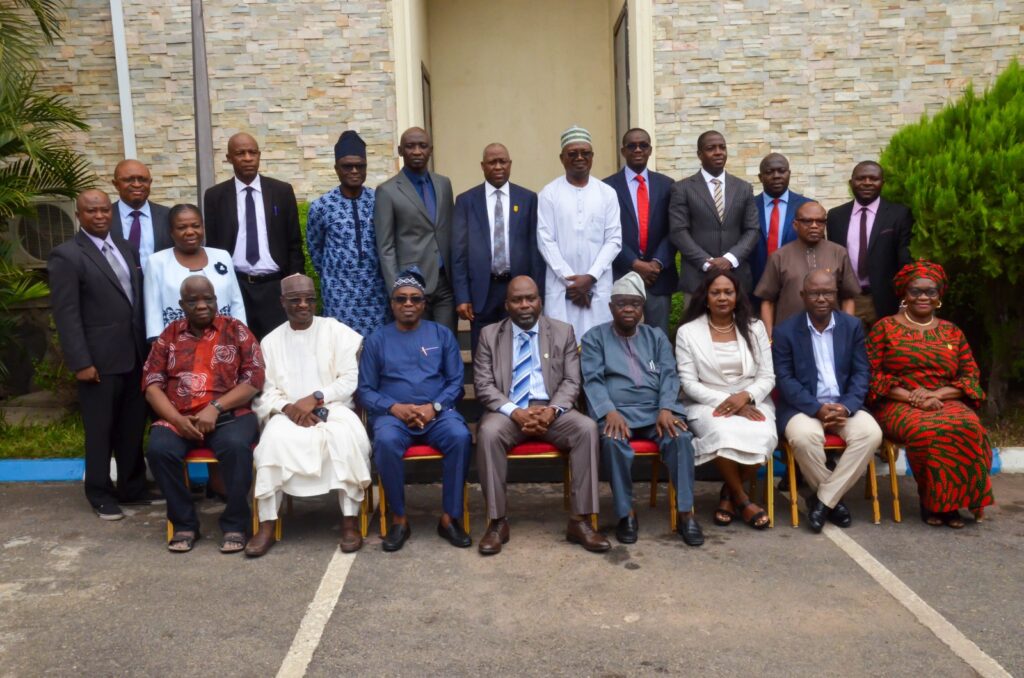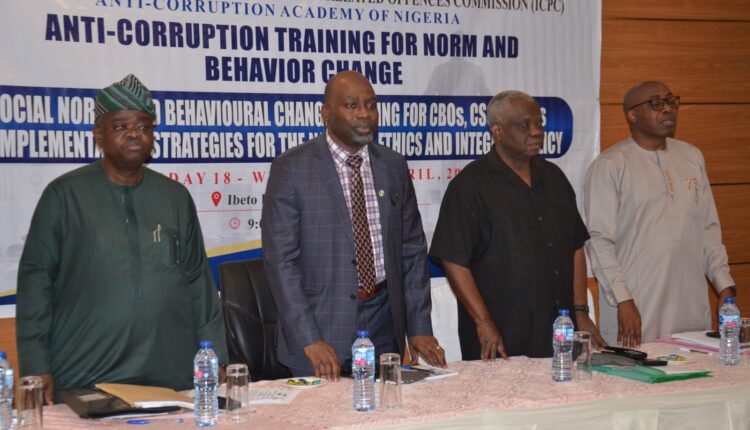Anti-corruption fight: Steps taken by ACAN to ensure behaviour change
From left: Provost, Anti-Corruption Academy of Nigeria (ACAN), Professor Olatunde Babawale, Chairman, Independent Corrupt Practices and Other Related Offences Commission (ICPC), Professor Bolaji Owasanoye, SAN, Professor Etanibi Alemika and former ACAN Provost, Professor Sola Akinrinade at the opening of a 2-day training on strategies for the implementation of National Ethics and Integrity Policy (NEIP) at Ibeto Hotel, Abuja from April 18-19, 2023.
The Anti-Corruption Academy of Nigeria (ACAN), the training and research arm and the parent organization, the Independent Corrupt Practices and Other Related Offences Commission, (ICPC) have been pushing for behaviour change and integrity in the fight against corruption. Apex News Exclusive feature some of the proactive steps by ACAN in this dimension.
By Anthony Maliki, Samuel Torlumun
No doubt, corruption has eaten deep into the fabrics of Nigeria society, so such that, unfortunately, it is now regarded as a “normal” phenomenon.
Indeed, the establishment of the Economic and Financial Crimes Commission (EFCC) and the Independent Corrupt Practices and Other Related Offences Commission, (ICPC), by President Olusegun Obasanjo administration were all geared towards addressing the issue of corruption, albeit, more in a law-and-order format. Arrest, prosecution and jail.
However, the ICPC has been evolving another method of tackling corruption. That is, through behaviour change and integrity matrix as encapsulated in the National Ethics and Integrity Policy (NEIP). As such, the Anti-Corruption Academy of Nigeria (ACAN), the training and research arm of ICPC, has taken upon itself to see to the actualization of the fight against corruption through a robust behaviour change and integrity strategic engagements.
Step-by-step, ACAN has been deliberately engaging various stakeholders to further speed up and spread the gospel of change. Going by the importance and depth of work, ACAN held a meeting of experts on 5th April, 2023 to work out a critical framework to finalize training deliverables and draft strategies for norm and behaviour change components of anti-corruption.
The meeting, with the support of MacArthur Foundation, brainstormed and advanced a clean copy of norms and behaviour change elements for the implementation of National Ethics and Integrity Policy (NEIP) where the Provost of ACAN, Professor Olatunde Babawale, also said the Academy has mainstreamed these aspects into its training programmes and curricula.
The Country Director, MacArthur Foundation, Dr. Kole Shettima pointed out some areas of support that would help in behaviour change. They include investigative journalism not only in English but other local languages especially using the media at the grassroots, strengthening the criminal justice system, supporting civil society organisations to promote accountability, working with faith-based organisations and supporting entertainment industry showing role models among others.
Other experts that provided roadmaps at the meeting included Etannibi Alemika, a Professor of Criminology and Sociology of Law, Secretary of ICPC, Professor Musa Usman Abubakar, former Provost of ACAN, Professor Sola Akinrinade, Professor Isaac Obasi of Department of Public Administration, University of Abuja and Alhaji Ashiru Baba, Director, Public Enlightenment and Education Department, ICPC.
Indeed, determined to bring the concept of behaviour change and integrity in the anti-corruption war, ICPC/ACAN brought 58 Civil Society Organisations, Faith-Based Organisations, Community-Based Organisations, the media and other stakeholders under one roof for two days to nurture the ideals of NEIP and spread behaviour change anti-corruption campaign further.
The two-day training, from 18-19 April, 2023, was interactive, engaging with open, frank and intense discussions centred on “Social norms and behavioural change training for CBOs, CSOs and FBOs on implementation strategies for National Ethics and Integrity Policy.” Among topics discussed at the training included: “Role of faith-based organisations in promoting national ethics and integrity” by Professor Etanibi Alemika, “The organized private sector, professional associations and promotion of NEIP” by Soji Apampa, “The media and promotion of NEIP” by Yusuf Ali, Managing Editor, Northern Operations of Nation Newspaper, “CSOs, CBOs and promotion of popular participation in the electoral process” by Professor Isaac Obasi and “CSOs, CBOs and promotion of community ownership of the NEIP” by Mrs. Rasheedat Okoduwa, mni, MON.

Management and staff of ICPC and ACAN, stakeholders and some CEOs in a photograph at the Executive Session on anti-corruption.
In his remarks during the opening formalities, ICPC Chairman, Professor Bolaji Owasanoye, SAN, underscored the importance of behavoiur change as law-and-order approach alone cannot deal with corruption. “Nigeria is crying for ethical reorientation” noting that many failed to live up to norms and ethics due to parochial interests.”
The Provost of ACAN, Professor Olatunde Babawale, said engagement with private orgnisations underscore ICPC’s mandate which allows engendering integrity as a component of anti-corruption efforts in both public and private sectors.
The Emir of Keffi in Nasarawa State, Alhaji Dr. Shehu Chindo Yamusa III represented by the Wambai of Keffi, Alhaji Ibrahim Usman said the National Ethics and Integrity Policy (NEIP) cannot come at a better time than now, due to challenges facing all sectors, be it government or private.
Alhaji Yamusa III commended ACAN for involving the traditional institutions because of its peculiarity and closeness to the common man which would go a long way at solving some of the hindrances against national unity and development.
Similarly, the Academy and ICPC had a two-day interactive tagged “Executive session of the Chairman of ICPC with CEOs of public agencies” where they interfaced on many issues of interest including integrity, attitude, norm and behavior change to check corruption.
While welcoming his guests, Chairman of ICPC, Professor Bolaji Owasanoye, SAN, said the corruption prevention mandate of the commission is critical to help CEOs avoid pressure from subordinates, family members, associates, National Assembly members, traditional and religious leaders among others to enable them develop confidence and courage to stand up to what is right.
According to him, “Ethics play a pivotal role in our behavior change programme. It starts with who you are. To a large extent the rules will force you to be who the system wants you to be. It is important for the CEOs to take note of some of these few points use as discussion points, and also take a look at our National Ethics and Integrity Policy, NEIP and familiarize yourselves with anti-corruption norm to avoid truly avoidable defaults and errors.”
The Provost of ACAN, Professor Olatunde Babawale in his address, said the experience and knowledge sharing session is aimed at developing skills and capacities of the CEOs to enable them take counter measures against corruption at their various agencies.
Amongst presentations to the CEOs were: “Administrative measures for controlling corruption and improving internal control mechanisms” by Mrs. Okoduwa, “Experience sharing or corrupt practices of particular relevance to CEOs” by Akeem Lawal, Director, Operations, ICPC and “Ethical issues in gifts and hospitality” by Richard Bello, a Deputy Director and Head of Programmes of ACAN.
ACAN also from May 9-11, 2023 had a workshop on “Administrative measures for controlling workplace corruption” where the Provost, Professor Babawale expressed concern that corruption is a major challenge to Nigeria and one of the many reasons for the setback as a people over the years.
According to the Provost, the essence of the workshop was to examine the various administrative measures at the disposal of MDAs and utilize same in controlling corruption in workplaces. Professor Babawale noted that in this regard, bureaucratic corruption has that remained a challenge to Nigeria’s anti-corruption efforts shall be exposed.
In a presentation “Bureaucratic corruption- A challenge to Nigeria’s anti-corruption efforts”, the Acting Director (Administration), ICPC, Bello Dauda Onimisi, noted that corruption is not only in monetary terms but also attitude, behaviour and greed among others.
According to him, the performance of public bureaucracy has always come under severe criticisms because of the gap that exists between its anticipated role and actual output.
Also, the maiden “Strategic Communication Workshop” for mostly Information and Communication Officers, Public Relations Officers, Media Officers, Protocol Officers and other related schedules drawn from mainly Ministries, Departments and Agencies (MDAs) took place from May 23-25 at ACAN facility in Keffi.
The workshop was meant to expose the media personnel by deploying communication in the fight against corruption.
Presentations made and discussed included “The concept and principles of strategic communications: A contextual analysis” by Alhaji Ashiru Baba, Director, Public Enlighten and Education of ICPC and “National Ethics and Integrity Policy: The communicator’s role” by John Oko Odey, a Deputy Director of ICPC, “Communicating the appropriate social norms for behaviour change”, “Gifts and hospitality: Avoiding the snare” and “Digital engagement for government” by Tolu Ogunlesi, former Special Assistant to the President on Digital and New Media.
The provost, who was represented by ACAN’s Registrar and Head of Administration, Mr. Samuel Lodam, pointed out that for the war against corruption to be fought and won in all MDAs sustainably, more anti-corruption practitioners must be recruited.
While not discountenance the progress made by fighting corruption through the law-and-order method in Nigeria, the continuous application of the behaviour change and integrity model would surely make an impact on the people and in return on the society, if not now, in the nearest future.


